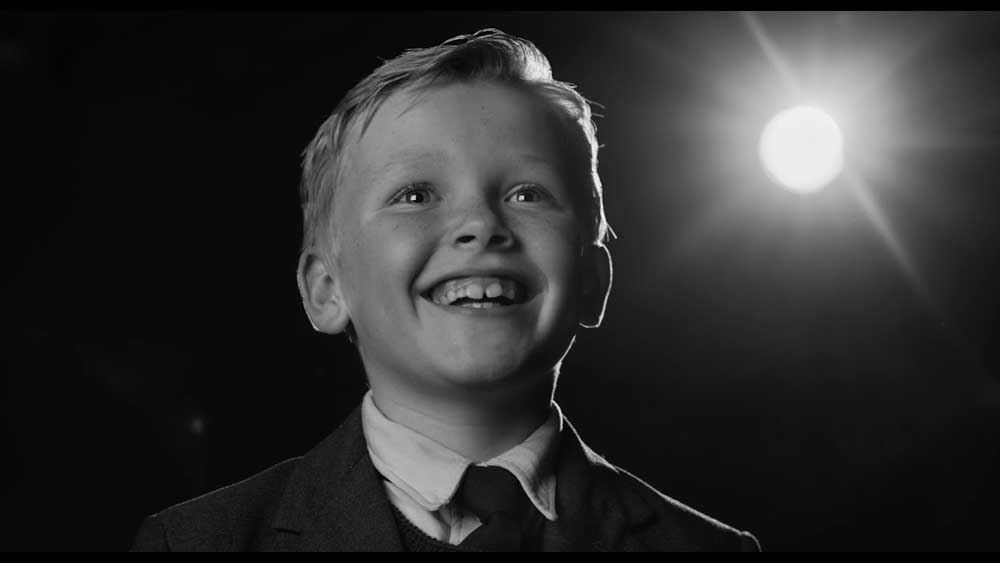Movie review: ‘Belfast’
Published 3:30 pm Wednesday, November 17, 2021

- Jude Hill in a scene from "Belfast."
Belfast, Ireland, as seen through the eyes of native son Sir Kenneth Branagh, is gorgeous, and his latest film based on his childhood and named after said city aims to be equally as stunning.
The writer-director opens “Belfast” with a montage of footage of landmarks of the Northern Irish city today in all its vibrant beauty set to a song by fellow Northern Irishman Van Morrison (he also did the music for the film). While this montage lasts a touch too long, it’s clear the love Branagh and his camera have for this city.
Then we focus on a mural painted on a section of the city’s Peace Wall depicting a group of men in caps with bruised faces and broken noses. And the jaunty Morrison music continues as the camera pans up over the wall to the lively street behind it. It’s August 1969, the film is now in black and white, and we are introduced to this tight-knit neighborhood where everybody knows your name.
But on this day, their lives would change forever.
In a continuous shot, we see Ma (Caitriona Balfe) as she calls for Buddy. Soon, the entire street of parents and other adults outside their row of homes also call for him. The camera cruises down the street showing happy neighbors carrying on during this summer afternoon, eventually settling on 9-year-old Buddy (Jude Hill) as he and his friends are slaying dragons equipped with wooden swords and garbage can lids.
When Buddy heads back home, he sees a crowd of rioters gathering at the top of the road with torches, Molotov cocktails and other weapons.
This was the start of the Troubles in Northern Ireland that lasted until the late ‘90s.
“Belfast” focuses on these early days of conflict through the eyes of Buddy and his tight-knit family. Pa (Jamie Dornan) works in England as a builder and comes home every so often to see his family, but Ma is left to pay off his debts to the tax collector.
Buddy’s family net is wide, with regular visits with his grandparents (expertly played by Ciaran Hinds and Judi Dench), and his cousins, aunties and uncles are also frequently around for get-togethers. At his level, everything about his life seems like something every kid would have — getting roped up in mischief with friends, having a crush on the smart girl in school, wanting to be the best footballer ever. But even when he’s busy just being a kid, the trouble brewing on both a macro and micro level is always looming.
Branagh’s script flows incredibly easily through these tragic circumstances without losing itself to high melodramatics or trope-y tricks. Instead, he balances it out beautifully with a lot of humor intertwined with drama.
The use of black and white also is very deliberate from a story perspective, and it’s not wasted as many angles use the monochromatic look well, but there are a few times when the beautiful shot suppresses the moment at hand.
Acting-wise, every single actor put in the work on this, and did it seemingly effortlessly. From veteran actors to Hill’s wonderfully natural performance, I was most struck by Caitriona Balfe. Having only been familiar with her melodramatic work on “Outlander,” I was impressed by her realism.
Everything in “Belfast” works well, despite a few technical hiccups that briefly threw me out of it. The story about a working-class family struggling to get by and wondering how they’ll stay safe and together is universal, but it’s an incredibly personal one for Branagh. His family left his hometown and everything and everyone they knew for a life in London, and he tells it effectively, with strong homages to films of similar nature that have come before, such as “Cinema Paradiso.” In this deeply personal story, he keeps things from becoming over-bloated or too overly sentimental, and delivers an emotional and loving film that is among his best work as a director.
“Belfast”
98 minutes
Rated PG-13 for some violence and strong language
3.5 stars








